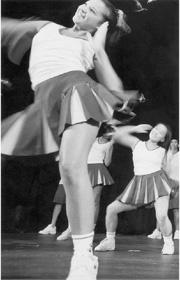WHEN SOMEONE’S FACE is plastered on giant billboards and every other magazine cover, that someone is fair game for criticism by those who are probably less attractive, less fortunate, and less rich. Celebrity is a double-edged sword. I am not perfect, but at least I can say with confidence that I don’t look like a horse, whereas Julia Roberts, with her elongated face and toothy smile, has always reminded me of a palomino. Apparently the creators of Notting Hill think the same of her, for it could not have been a mere coincidence that in a pivotal scene, Hugh Grant’s character, William, poses as a reporter from Horse and Hound and tells Julia that she is the magazine’s favorite movie star—aside from Black Beauty.
Notting Hill
directed by Roger Michell
starring Julia Roberts, Hugh Grant
opens May 28 at Pacific Place, Oak Tree, Factoria, and others
So it is that horse-ism—er, fame—and not romantic love, that is the real subject of Notting Hill, which reunites screenwriter Richard Curtis, producer Duncan Kenworthy, and Hugh Grant—all alums of 1994’s Four Weddings and a Funeral. Julia Roberts is cast as Anna Scott, an insanely famous actress who stars in big-budget mainstream movies, whose face appears on the sides of buses, and whose love life is dissected by gossip columnists. Roberts has denied that Scott is anything like herself, but the proximity to her life is refreshing—at least we don’t have to try to swallow the fantasy that she is a graduate of Brown University working as a well-known food critic (My Best Friend’s Wedding) or that she’s an erudite historian of Italian art (Everybody Says I Love You). As Anna Scott, Roberts actually comes across as genuine for the first time in her career since Pretty Woman (1990).
It’s not as easy to believe Hugh Grant as William Thacker, an average, diffident fellow who seems to rarely venture out of Notting Hill, his beloved “small village” in the city of London. Just 18 yards away from his narrow and cramped home, which he shares with a gangly Welshman (Rhys Ifans), is his narrow and cramped book shop, the kind of untidy but charmingly individualistic business that is an endangered species in this country. He’s a small-time guy tied to his neighborhood and friends (and perhaps the occasional call girl). She’s a big star who jets to different cities every week. But this being romantic comedy, where the improbable is made probable, for some odd reason they get together.
Fame is the barrier that must be crossed by the soon-to-be lovers. Early on, William tells Anna, “It was nice meeting you . . . surreal, but nice.” Anna then kisses him out of the blue (because big stars can get away with that). Later, she reveals her biggest fear to William and his friends. “Someday my looks will go, and people will figure out that I can’t act, and I’ll just be an old woman who looks a little bit like someone who used to be famous.” It’s the first of many scenes where the star’s “surrealness” comes undone.
Notting Hill is a cheerful, humorous movie, but it leaves the same loophole that Four Weddings and a Funeral did—that is, it never made me believe for a second that its lead characters were in love. While screenwriter Curtis is excellent in setting up his premise, as well as drawing his characters, he leaves it a mystery as to why the union between Anna and William must prevail. Surely, one evening walk through a park isn’t reason enough for William to leave life as he knows it and step into the spotlight with Anna, is it? The story’s upshot feels a bit cheap—especially when the rest of the script is so clever.
WHILE CURTIS’ STORY centers on William and Anna, he’s written the surrounding characters so well that they steal the movie away. Ifans is hysterically funny as Spike, a swell but irresponsible fellow, whose wardrobe consists of T-shirts with messages that make “I’m with Stupid” seem reserved. William’s circle of friends, played by British actors Hugh Bonneville, Emma Chambers, Tim McInnerny, and Gina McKee, are so warm and likable that they come across as the real heart of the story. In a very non-Hollywood way, none of these characters lives in a fancy loft, or drives a brand-new Volkswagen bug, or even has straight teeth. It is through this “ordinary” group, and not William and Anna, that we see an example of a successful relationship, along with all the fantastic romance, disappointments, and emotional strength that keep people in love.






